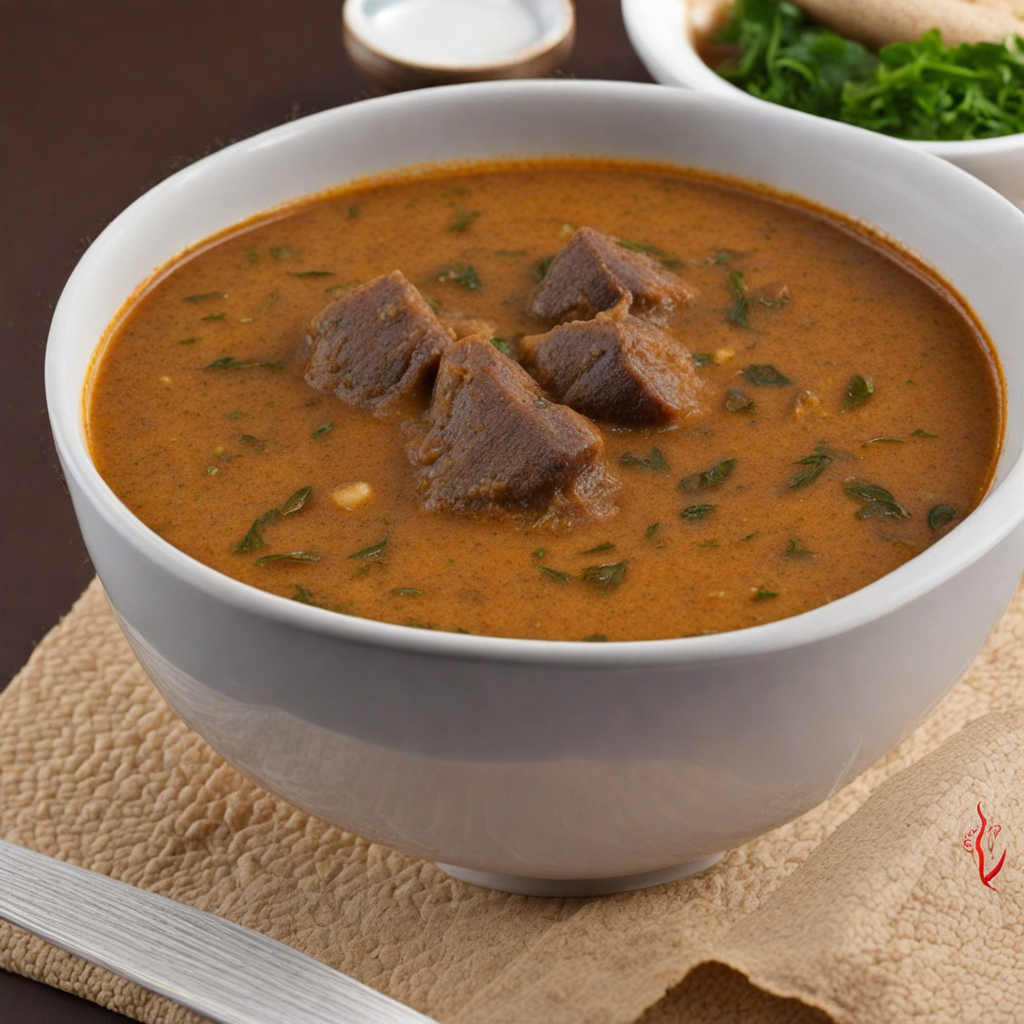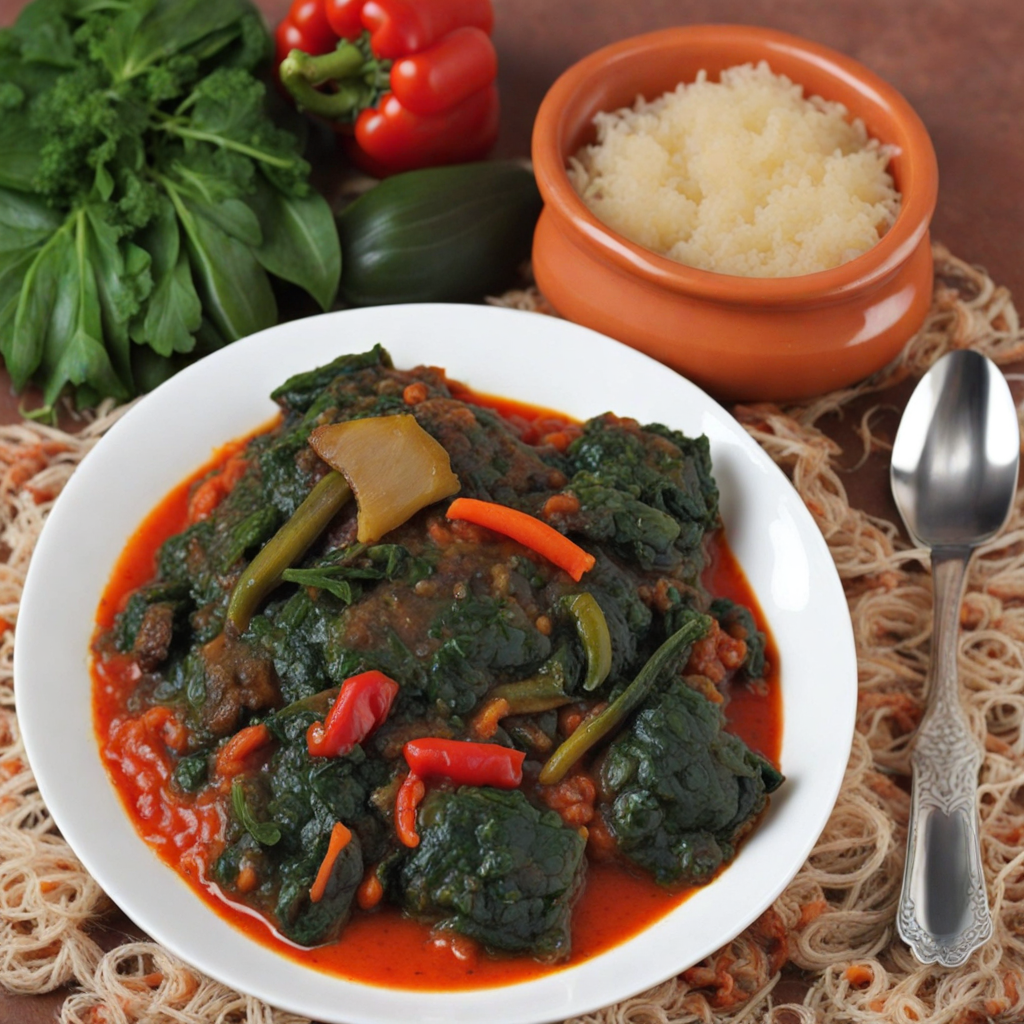Ogbono Soup
Ogbono Soup, a beloved dish from Nigeria, is a rich and hearty soup made from the ground seeds of the wild mango tree, known as Ogbono. The unique texture of this soup is one of its most appealing features; it has a thick, viscous consistency that is both soothing and satisfying. The seeds are finely ground to create a smooth paste, which, when cooked, melds beautifully with other ingredients. This soup is often prepared with a variety of proteins, including beef, goat, or fish, which infuse the dish with deep, savory flavors. The inclusion of leafy greens, such as spinach or bitter leaf, adds a touch of freshness and a vibrant green color to the mix, making it visually appealing as well.
How It Became This Dish
The History of Ogbono Soup: A Culinary Treasure of Nigeria #### Origins Ogbono soup, a beloved dish in Nigeria, boasts a rich history deeply intertwined with the cultural fabric of various ethnic groups, notably the Igbo and Yoruba. The soup derives its name from the seeds of the African wild mango, scientifically known as *Irvingia gabonensis*. These seeds are not only a culinary delight but also a vital part of traditional medicine in many African cultures. The wild mango tree, native to the tropical regions of West and Central Africa, has been used for centuries, both for its fruit and its seeds, which are ground to produce the thick, viscous soup that characterizes Ogbono. Historically, the use of Ogbono seeds can be traced back to the indigenous peoples of West Africa. They recognized the nutritional value and culinary potential of the seeds long before they became a staple in modern Nigerian cuisine. The Igbo people, in particular, are credited with popularizing the soup, integrating it into their daily diets and rituals. Over time, Ogbono soup transcended its humble beginnings to become a symbol of hospitality and communal sharing, often prepared for special occasions and family gatherings. #### Cultural Significance Ogbono soup holds a significant place in Nigerian culture, not just as a dish but as a representation of identity and community. In many Nigerian households, food is a cornerstone of social interaction and bonding. Ogbono soup is often enjoyed with pounded yam, fufu, or other starchy sides, creating a communal dining experience where family and friends gather to share a meal. The act of eating together is seen as a way to strengthen relationships and foster unity within families and communities. In traditional Igbo cultures, Ogbono soup is often prepared for various ceremonies, including weddings, naming ceremonies, and other rites of passage. It is a dish that evokes nostalgia and a sense of belonging, often passed down through generations. The preparation of Ogbono soup has become a cherished family tradition, with recipes varying slightly from one household to another, reflecting personal touches and regional influences. Moreover, Ogbono soup is recognized for its health benefits. The seeds are rich in dietary fiber, healthy fats, and essential nutrients, making them a staple in the diets of many Nigerians. Traditionally, it is believed that the soup can aid digestion and provide energy, further emphasizing its importance in daily life. #### Development Over Time The evolution of Ogbono soup is a testament to the dynamic nature of Nigerian cuisine. While the core ingredients—Ogbono seeds, water, and various meats—have remained constant, the methods of preparation and accompanying ingredients have adapted over time, influenced by regional variations and globalization. In its traditional form, Ogbono soup was primarily prepared with locally sourced ingredients, including bush meat, fish, and leafy vegetables. However, as urbanization and globalization have taken hold, the dish has seen an influx of new ingredients and flavors. Modern variations of Ogbono soup may include chicken, shrimp, or even exotic spices that reflect the diverse culinary influences present in contemporary Nigerian cooking. The approach to cooking Ogbono soup has also evolved. Traditionally, the soup was made by grinding the Ogbono seeds into a fine powder before adding them to a pot of boiling water and other ingredients. Today, many cooks opt for a more efficient method, often using pre-ground Ogbono for convenience. This shift has made the dish more accessible, allowing it to reach a wider audience both within Nigeria and in the diaspora. As Nigerian cuisine has gained international recognition, Ogbono soup has found its way into the kitchens of food enthusiasts around the world. Chefs and home cooks outside of Nigeria have embraced the soup, experimenting with its flavors and incorporating it into fusion dishes. This globalization of Ogbono soup not only highlights the adaptability of Nigerian culinary traditions but also promotes cultural exchange and appreciation. #### Regional Variations While Ogbono soup is predominantly associated with the Igbo and Yoruba cultures, it has regional variations that reflect the diversity of Nigeria. In the Yoruba tradition, for instance, Ogbono soup may be prepared with the addition of egusi (melon seeds), creating a richer flavor profile. This version is often enjoyed with amala, a starchy side made from yam flour, which complements the soup's thick texture. In contrast, some Igbo variations emphasize the use of fresh vegetables, such as bitter leaf or spinach, to enhance the soup's nutritional content and flavor. The choice of meat also varies by region, with some preferring goat or chicken, while others may include fish or game meat. These variations showcase the creativity and resourcefulness of Nigerian cooks, who adapt the dish to suit local tastes and available ingredients. #### Conclusion Ogbono soup stands as a culinary treasure of Nigeria, rich in history, cultural significance, and adaptability. From its origins rooted in the traditions of the Igbo and Yoruba peoples to its evolution in the context of modern Nigerian cuisine, Ogbono soup reflects the dynamic interplay between food, culture, and community. It is more than just a dish; it is a symbol of togetherness, identity, and resilience. As Nigerian cuisine continues to gain recognition on the global stage, Ogbono soup remains a proud representation of the country’s culinary heritage, inviting people from all walks of life to savor its unique flavors and the stories behind them. Whether enjoyed at a family gathering, a festive celebration, or in a restaurant far from its homeland, Ogbono soup embodies the essence of Nigerian hospitality and the enduring connection to one’s roots.
You may like
Discover local flavors from Nigeria







